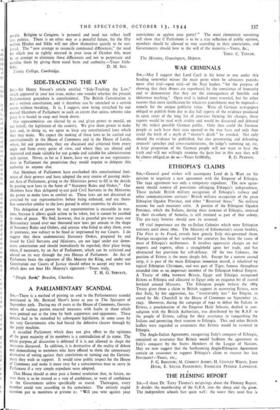A PARLIAMENTARY SCANDAL
Sia,—There is a method of putting an end to the Parliamentary scandal mentioned in Mr. Bernard. Shaw's letter to you in The Spectator of September 29th. During my 18 years m the House of Commons, Govern- ments of various parties enacted measures with faults in them which were pointed out at the time by both supporters and opponents. These defects had to be remedied by subsequent legislation, in some cases by the very Governments who had forced the defective clauses through by the party machine.
A so-called Parliament which does not give effect to the opinions.. of the great majority of its members is a contradiction of its name. The whole purpose of discussion is defeated if it is not allowed to shape the measures discussed. In addition, it is destructive of the reality of debate and demoralising to members who have offered to them the unnecessary alternative of voting against their convictions or turning out the Govern- ment they wish to support. It would raise public respect for the House of Commons and make it more easy for a conscientious man to serve in Parliament if a very simple expedient were adopted.
That House should at once pass a formal resolution that, in future, no vote there is to be treated as a vote of confidence, or want of confidence in the Government unless specifically so stated. Thereupon, every member could vote according to his conscience. The entirely stupid question put to members at present is: "Will you vote against your
convictions or against your party? " The most elementary reasoning will show that if Parliament is to be a true reflection of public opinion, members should be allowed to vote according to their convictions, and Governments should bow to the will of the majority.—Yours, &c., The Moraine, Grassington, Skipton.
THEO. C. TAYLOR.


























 Previous page
Previous page